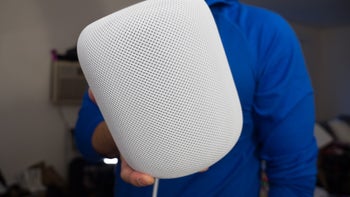One of Apple's least popular devices showed some life during the holiday quarter

The smart speaker remains one of the tech industry's fastest-growing products. These devices feature a speaker paired with a virtual assistant. For example, the category was created by Amazon with its Echo line that features virtual assistant Alexa. With a smart speaker, one can control smart home devices, stream music, get the latest news, sports, weather, stock prices, order a pizza, send text messages, receive traffic updates and even make a phone call. And with prices as low as $30, several households have multiple speakers in different rooms.
While its once huge lead has practically evaporated, Amazon remained the largest smart speaker manufacturer in the world during the fourth quarter according to Strategy Analytics. First, though, let's look at the overall market. For the quarter which ran from October through December, a record 55.7 million units were delivered, an annual gain of 44.7%. The research firm credited strong holiday sales in the U.S. and Europe for the record quarter along with a recovery in Google's speaker business thanks to new products. For all of 2019, a record 146.9 million smart speakers shipped, an impressive 70% gain year-over-year.
The Apple HomePod actually picked up market share during the fourth quarter of 2019
For the fourth quarter of 2019, Amazon shipped 15.8 million Echo devices worldwide, up 16% from last year's fourth quarter. That gave Amazon a leading 28.3% share of the market during the period, down from the 35.5% slice of the smart speaker pie that the company had during the 2018 fourth quarter. How could Amazon grow its Echo shipments by 16% but see its market share decline? That happened because Amazon's growth was much lower than the 44.7% growth of the overall industry during the quarter.

Amazon remained the largest smart speaker manufacturer globally during the fourth quarter of 2019
With a 24.9% market share, Google was second. During the fourth quarter, it shipped 13.9 million units up 20% year-over-year. A trio of Chinese brands finished third through fifth. Baidu, Alibaba, and Xiaomi shipped 5.9 million, 5.5 million, and 4.7 million speakers respectively. Baidu, which owned 10.6% of the global market during the quarter, had the highest annual growth rate of all listed manufacturers at 171%. Xiaomi, with 8.4% of the market from October through December, saw its speaker deliveries soar 167% during the three month time period.
Apple's HomePod remains a disappointment but did show some life during the holiday quarter. While the company shipped only 2.6 million units in Q4, that was a 65% rise from the 1.6 million it delivered during last year's fourth quarter. Apple had a market share of 4.7% from October through December, up from 4.1% during the 2018 fourth quarter. Apple has cut the price of the HomePod from the original $349 to $299 which is still pricey for a speaker. There has been talk about a lower-priced HomePod 2; either Apple has done a great job keeping mum or such a device is not coming any time soon.
Strategy Analytics Vice President David Mercer, commenting on the whole year, said, "In 2019 Amazon and Google retained their strong leadership positions in North America and Europe, where they accounted for more than three-quarters of all smart speaker sales. However, their shares fell slightly in both regions, confirming our user research findings that buyers are prepared to invest in other brands. Competing vendors must focus resources on specific smart speaker customer segments and use cases in order to maximize revenues and profitability."
Commenting specifically about the last three months of 2019, Strategy Analytics' Director David Watkins said, "Consumer appetite for smart speakers remained undimmed during the all-important Q4 period as newly launched devices with improved feature sets and audio performance helped drive record quarterly shipments. Consumers across the world were once again enticed by scarcely believable deals from leading brands such as Google, Amazon, Baidu, and Alibaba, while Google, in particular, stepped up its giveaway promotional activity in partnership with brands such as YouTube and Spotify."










Things that are NOT allowed: